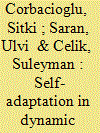| Srl | Item |
| 1 |
ID:
193534


|
|
|
|
|
| Summary/Abstract |
With the illegal Russian annexation of Crimea in 2014, there has been increasing talk of hybrid warfare. However, due to its wide use, this term has been emptied of its meaning. Because of this, the Full Spectrum Conflict (FLC) concept will be adopted. Operations that employ asymmetrical tactics are not extraneous to Russian strategic thinking and have various characteristics that allow them to be traced back to complexity theory and in particular to Complex Adaptive Systems. A similar argument also applies to Information Warfare, one of the most important tools of Full Spectrum Conflicts. Starting from Clausewitz, we will try to describe war, the modern FSCs, and Information Warfare as Complex Adaptive Systems. Then we will try to demonstrate how, by controlling the information flow during the Russian annexation of Crimea, Moscow applied complexity to the adversary on the one hand and stabilized the Crimean social system on the other.
|
|
|
|
|
|
|
|
|
|
|
|
|
|
|
|
| 2 |
ID:
149490


|
|
|
|
|
| Summary/Abstract |
This paper examines the response to the 2006 avian influenza crisis in Turkey. Using complex adaptive systems as the theoretical framework, the paper discusses the extent to which the Turkish disaster management system showed self-adaptation during the crisis. Self-adaptation requires organizational flexibility that facilitates sufficient information flow through technical and cultural infrastructures. This study uses qualitative methods to analyze the data. The research findings indicate that during the crisis, Turkish disaster management was faced with critical difficulties related to organizational, technical and cultural capacities that undermined its capacity to adapt to changing conditions. The system was able to manage these difficulties in seven to ten days; however, Turkey’s contemporary disaster response services still require a transformation to effectively respond to any influenza pandemic.
|
|
|
|
|
|
|
|
|
|
|
|
|
|
|
|